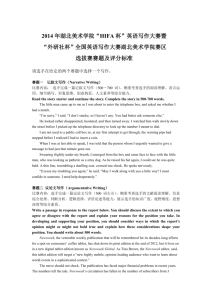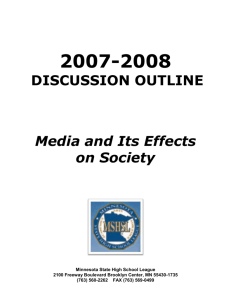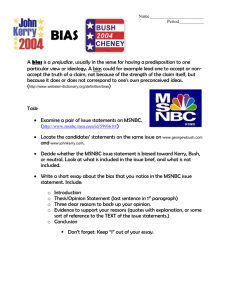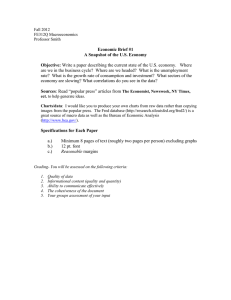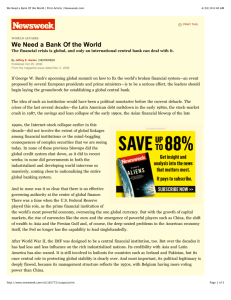... Neither Is the State
advertisement
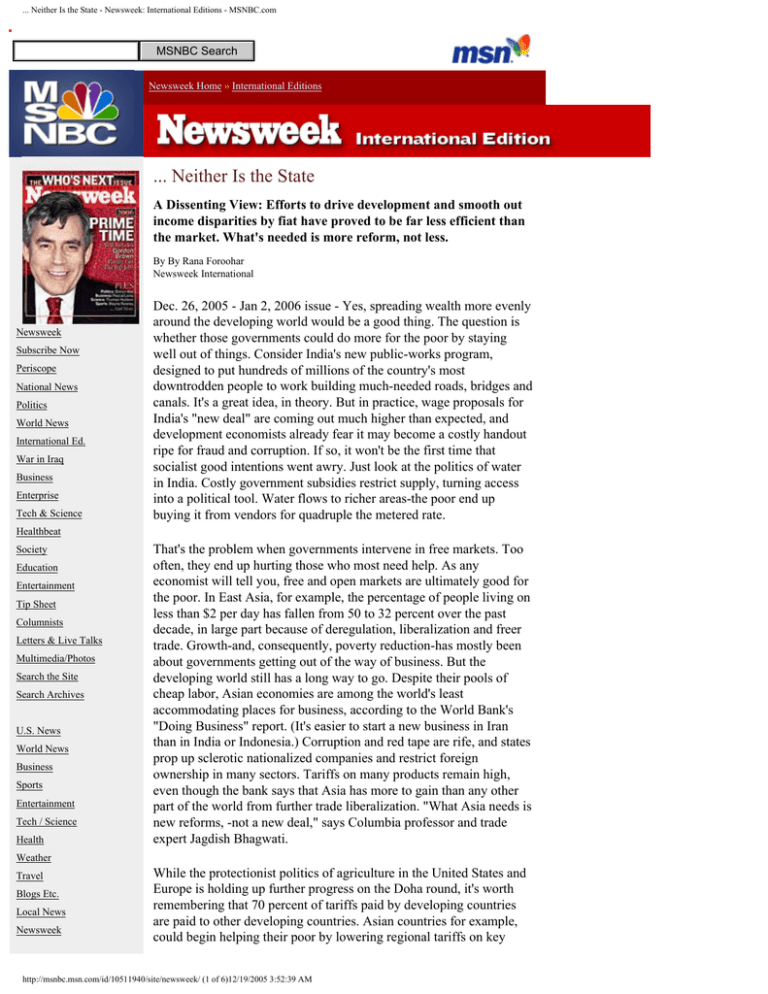
... Neither Is the State - Newsweek: International Editions - MSNBC.com MSNBC Search Newsweek Home » International Editions ... Neither Is the State A Dissenting View: Efforts to drive development and smooth out income disparities by fiat have proved to be far less efficient than the market. What's needed is more reform, not less. By By Rana Foroohar Newsweek International Newsweek Subscribe Now Periscope National News Politics World News International Ed. War in Iraq Business Enterprise Tech & Science Dec. 26, 2005 - Jan 2, 2006 issue - Yes, spreading wealth more evenly around the developing world would be a good thing. The question is whether those governments could do more for the poor by staying well out of things. Consider India's new public-works program, designed to put hundreds of millions of the country's most downtrodden people to work building much-needed roads, bridges and canals. It's a great idea, in theory. But in practice, wage proposals for India's "new deal" are coming out much higher than expected, and development economists already fear it may become a costly handout ripe for fraud and corruption. If so, it won't be the first time that socialist good intentions went awry. Just look at the politics of water in India. Costly government subsidies restrict supply, turning access into a political tool. Water flows to richer areas-the poor end up buying it from vendors for quadruple the metered rate. Healthbeat Society Education Entertainment Tip Sheet Columnists Letters & Live Talks Multimedia/Photos Search the Site Search Archives U.S. News World News Business Sports Entertainment Tech / Science Health That's the problem when governments intervene in free markets. Too often, they end up hurting those who most need help. As any economist will tell you, free and open markets are ultimately good for the poor. In East Asia, for example, the percentage of people living on less than $2 per day has fallen from 50 to 32 percent over the past decade, in large part because of deregulation, liberalization and freer trade. Growth-and, consequently, poverty reduction-has mostly been about governments getting out of the way of business. But the developing world still has a long way to go. Despite their pools of cheap labor, Asian economies are among the world's least accommodating places for business, according to the World Bank's "Doing Business" report. (It's easier to start a new business in Iran than in India or Indonesia.) Corruption and red tape are rife, and states prop up sclerotic nationalized companies and restrict foreign ownership in many sectors. Tariffs on many products remain high, even though the bank says that Asia has more to gain than any other part of the world from further trade liberalization. "What Asia needs is new reforms, -not a new deal," says Columbia professor and trade expert Jagdish Bhagwati. Weather Travel Blogs Etc. Local News Newsweek While the protectionist politics of agriculture in the United States and Europe is holding up further progress on the Doha round, it's worth remembering that 70 percent of tariffs paid by developing countries are paid to other developing countries. Asian countries for example, could begin helping their poor by lowering regional tariffs on key http://msnbc.msn.com/id/10511940/site/newsweek/ (1 of 6)12/19/2005 3:52:39 AM ... Neither Is the State - Newsweek: International Editions - MSNBC.com Multimedia News Video Most Popular NBC NEWS MSNBC TV Today Show Nightly News Meet the Press Dateline NBC products such as rice. This isn't easy because in most countries, agriculture is a highly sensitive issue. But the consequences of the trade status quo are high, because when rice prices go up, so does poverty. In Indonesia, for example, growth has been lagging for years in part because of an absolute ban on foreign rice. "Indonesia should use cheaper rice from Vietnam, Thailand or India to fuel diversification into higher-end products like meat and poultry," says Peter Timmer, a senior fellow at the Center for Global Development in Washington, D.C. Instead, the government continues to subsidize its own less productive growers. The reason is no surprise. Rice farmers are the largest identifiable voting bloc in the country. As Indonesian politicians should already know, subsidies ultimately carry a high cost. The country was forced to dismantle its own fuelsubsidy program recently when rising international oil prices pushed costs so high that they triggered a fiscal crisis. Economists question how useful the subsidies were to begin with, since the artificially low cost of fuel encouraged waste, and the poorest never used oil and gas, but rather kerosene. The government is now getting kudos for its fuelvoucher program, designed to buffer higher postsubsidy prices, not because it's a new deal but because it represents a pullback from its original market-skewing policy. Aside from not tampering with trade, developing-world governments would do well to welcome more foreigners, particularly in the services sector. Air transport, logistics, financial services and telecoms are still skewed in favor of domestic players in many parts of Asia, Latin America, Africa and the Middle East. It's no accident that richer economies like Hong Kong and Singapore are also the most open to foreign investment and ownership. Big multinationals are an easy target for politicians pandering to globalization fears, but in many cases these companies actually help develop local economies by raising standards of productivity and governance. The level of corruption and mismanagement in Indonesia's financial-services sector changed almost overnight when foreign banks were allowed greater ownership in 1998. It's hoped the same will happen in China as it opens up under WTO rules. In the retail sector, there's evidence that big chains like WalMart and France's Carrefour, which are sourcing more food locally, can actually help small farmers. In a 100km ring around Beijing, local farmers are beginning to use bulking agents to sell to the big stores, which now source about 35 percent of their food locally. In the West Java region of Indonesia, Carrefour is working with regional universities to teach local producers how to grow higher-value products, like specialty lettuces. Of course, in the poorest and most remote regions, foreign investment has yet to trickle down. That's why some government programs with a new-deal twist, like China's Go West initiative, are a good idea: they ultimately aim to reduce state involvement in business by encouraging more private enterprise in areas that need growth most. "There are still a lot of stodgy, state-owned businesses in the interior of China, and if Go West can bring outside investors there and shake things up, that's a good thing," says Tim Clissold, a longtime investor in the Middle Kingdom and author of "Mr. China." "It's intervention, but of a different sort than in the past." http://msnbc.msn.com/id/10511940/site/newsweek/ (2 of 6)12/19/2005 3:52:39 AM ... Neither Is the State - Newsweek: International Editions - MSNBC.com Ultimately, the success of all the new programs will depend on the aptitude of the policymakers running them. In places like India, for example, the track record of bureaucrats isn't good. Health care and primary education are a huge factor in poverty reduction, yet the average absentee rate of teachers in India is 25 percent, and doctors in state clinics don't show up 40 percent of the time. That means the poor have to shell out for private doctors and teachers (many of whom are the absentee state workers). A recent study by Harvard economist Michael Kremer found that the quality of state care went up dramatically in regions in which NGOs competing with each other for international funds were allowed to manage schools and clinics. Because they had to show results to their donors, they were better able to enforce attendance. It's a classic case of how markets can often manage things better than governments. That's a lesson that politicians offering any sort of new New Deal should remember. © 2005 Newsweek, Inc. Print this Email this MORE FROM NEWSWEEK: INTERNATIONAL EDITIONS Newsweek: International Editions Section Front . Your Heart: The Latest Word in Research . Fashion: Designer Knockoffs Are Finding Success . Indonesia: Is Boss All Talk On Tackling Terror? . Newsweek: International Editions Section Front TOP STORIES • Stories From the Storm: Katrina's Survivors • America's Top General in Iraq on What's Next • Iraq: How Much Longer for U.S. Troops? • Movies: The 'Code' Breakers • Clift: A Dem's Fresh Ideas on Health Care • Bush says U.S. winning in Iraq • 24 ex-Saddam aides freed • Militant video claims hostage killing • GOP lawmakers agree to spending cut • Attorney general: Domestic spying legal FROM THIS WEEK'S ISSUE http://msnbc.msn.com/id/10511940/site/newsweek/ (3 of 6)12/19/2005 3:52:39 AM ... Neither Is the State - Newsweek: International Editions - MSNBC.com WORLD AFFAIRS • Iraq: Still No Timetable for U.S. Withdrawal • Asia: The Tsunami, One Year Later • 'Conditions Aren't Ripe' • France: Any Real Change After the Fires? • Changing Partners? • Italy: Why Rome's Monuments Are Crumbling WORLD BUSINESS • Sports: Who Cares About Turin? • Flying South • Whose Forest? • The Future of the Dollar • How Latino Workers Could Change New Orleans • Players to Watch in 2006 • WTO: Is Free Trade Really the Answer? • ... Neither Is the State • Europe Will Get It Right SOCIETY AND THE ARTS • Final Bows SCIENCE AND TECHNOLOGY • Computer Software That Writes Itself DEPARTMENTS • Lebanon: No More Cedar Revolution? • CW: 2005 Edition-A Year of Living Dangerously • International Perspectives 2005 • Zakaria: Big Enough To Know Better • Mail Call: Cheney's Cheney http://msnbc.msn.com/id/10511940/site/newsweek/ (4 of 6)12/19/2005 3:52:39 AM ... Neither Is the State - Newsweek: International Editions - MSNBC.com Live Vote Is the French government doing enough to ease tensions after the Paris riots? Yes No I don't know Vote to see results BLOG TALK Read what bloggers are saying about this Newsweek article Related Stories | What's this? • Net betting foes cry 'terrorism' • Davos: How High-Tech Tools Can Help the Poor • WTO upholds right to protect food names • Microsoft plans to invest $1.7 billion in India • India gets Europe's OK to join fusion club Search the Site ARCHIVES | RSS FEEDS | NEWSWEEK RADIO | ABOUT NEWSWEEK | SUBSCRIBER SERVICES PRESSROOM | ADVERTISING INFORMATION | VIEWPOINT | CONTACT US | EDUCATION PROGRAM BACK COPIES | RIGHTS AND REPRINT SALES | SHOWCASE ADS | ONLINE AND DISTANCE LEARNING DIRECTORY http://msnbc.msn.com/id/10511940/site/newsweek/ (5 of 6)12/19/2005 3:52:39 AM ... Neither Is the State - Newsweek: International Editions - MSNBC.com Cover | U.S. News | World News | Business | Sports | Tech/Science | Entertainment | Travel | Health | Blogs Etc. | Weather | Local News Newsweek | Today Show | Nightly News | Dateline NBC | Meet the Press | MSNBC TV About MSNBC.com | Newsletters | RSS | Podcasts | Help | News Tools | Jobs at MSNBC.com | Contact Us | Terms & Conditions | Privacy © 2005 MSNBC.com MSN Privacy | Legal http://msnbc.msn.com/id/10511940/site/newsweek/ (6 of 6)12/19/2005 3:52:39 AM Feedback | Help
